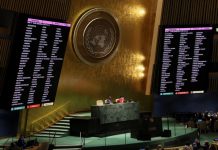Whether Libya can achieve a lasting peace that could lead to elections remains to be seen. There have been many truce agreements in the past only to breakdown, throwing the country in to more chaos. It’s still to be seen that whether the foreign powers fueling the war and Libya’s militias will give up their weapons and ambitions.
For now, though, the United Nations, which brokered the cease-fire, is hailing the pact as a “historic achievement.” The warring sides signed the agreement at a ceremony Friday in Geneva.
“The road to a permanent cease-fire deal was often long and difficult,” Stephanie Williams, the U.N. envoy to Libya, said at the ceremony, adding that “we have to give people hope of a better future.” She said she hopes the agreement will end “the suffering of the Libyan people.”
While full details were not provided, Williams said the truce calls for fighters from both sides to pull back from front-line positions and return to their bases. More significantly, it calls for the withdrawal of all foreign forces — especially those from key players Turkey and Russia — and all mercenaries within three months. The deal, Williams added, will also allow tens of thousands of internally displaced people, as well as refugees outside the country, to return to their homes.
But Williams, a former U.S. State Department official, conceded that mediators have “a lot of work to do in the days and weeks ahead to implement the commitments outlined in this agreement.”
Libya has been facing turmoil since the Arab Spring uprising and NATO intervention that led to the killing of Libya’s dictator Moammar Gaddafi. The current crisis is between U.N. installed government in Libyan capital against a government based in the East.
Both sides are supported by a constellation of militias seeking power and wealth, as well as regional and Western powers that want to exert influence over the strategically important oil-producing country nestled along the Mediterranean Sea and in Europe’s backyard.
Over the past year, Libya has experienced its most violent era since the revolution, triggered by an offensive on Tripoli in April 2019 by renegade commander Khalifa Hifter, who is aligned with the eastern authorities. Militias in the west rose up to oppose Hifter and prevent the Tripoli government from falling.
On Wednesday, Williams told reporters that the warring factions had reached agreements to open air and land routes within the fractured nation, tone down harmful rhetoric and pave the way to fully resume Libyan oil production.
The U.N. Secretary General António Guterres after the signing ceremony Friday tweeted.
The conflict till now has sucked in more than twelve countries which supplied weaponry, mercenaries and training to both sides in violation of an international arms embargo. The United Arab Emirates, Russia, Egypt and other powers backed Hifter. Turkey, Qatar and others entered to back the Tripoli government.
In June Hifter’s offensive was pushed back. Since then, fighting has died down, even as both sides prepared to battle over the strategic city of Sirte, currently under Hifter’s control.
The lowering of tensions amid international pressure provided an opening for U.N.-sponsored mediators to resurrect talks on a truce. This week marked the fourth round of talks between members of a joint military commission, which the United Nations hopes will eventually lead to national elections in Libya.
Longtime diplomats and analysts working on Libya also took to social media and cautiously welcomed the agreement. But they warned that peace in Libya ultimately lies in the hands of the foreign powers and the militias fueling the conflict.AD
Jonathan Winer, a former U.S. special envoy to Libya, tweeted that “confidence-building measures” are essential to provide a “foundation for disarmament” and a return to normal after any civil conflict. He also called for “visible actions by foreigners to withdraw” according to a timetable.
Wolfram Lacher, a Libya expert at the German Institute for International and Security Affairs, tweeted that
Still, considering that six months ago “there was a huge war and continuously record-breaking” casualty numbers, the cease-fire “shouldn’t be sneered at,” tweeted Tarek Megerisi, a Libya analyst at the European Council on Foreign Relations. “But we really shouldn’t let it give a false sense of security given how disingenuous those involved are. It’s still far easier to end up back at war than a real peace.”









